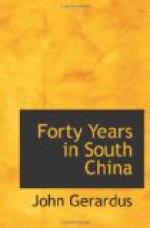During that year Mr. Talmage was called to stand by the “first gash life had cut in the churchyard turf” for him. His beloved wife, Mrs. Abby Woodruff Talmage, was called to her reward, leaving Mr. Talmage with four motherless little ones. He was compelled to go to the United States to secure proper care for his children. He came in time to attend the General Synod of 1863. There he advocated most earnestly the course which the brethren at Amoy had taken.
Dr. Isaac Ferris brought the subject before the Synod in these words:
“In 1857 the Synod met at Ithaca, and a most remarkable Synod it was. According to the testimony of all who were present the Spirit of God unusually manifested His gracious presence. A venerable minister on his return remarked, ‘It was like heaven upon earth.’ That Synod, under this extraordinary sense of the Divine presence and unction, judged that the time had arrived for the Church to take the responsibility of supporting its foreign missionary work upon itself, and, accordingly, in very proper resolutions, asked of the American Board to have the compact which had been in operation since 1832 revoked, and the Mission transferred to our Foreign Board.
“It was at that meeting that a memorial of our brethren at Amoy on the subject of organization, very ably drawn, and presenting fully their views and reasonings, was read and deliberated on. Their work had been wonderfully blessed, and the whole Church was called to thanksgiving, and the time seemed at hand to realize the expectations of years. The brethren asked advice, and the Synod adopted the carefully-drawn report of a committee of which the President was chairman, advising the organization of a Classis at as early a day as was practicable. Our brethren at Amoy were not satisfied with this advice, and considered the subject as not having had a sufficient hearing.
“In the progress of their work they have deemed it proper to form a different organization from what the Synod advised, and which was in harmony with the constant aim of our Church on the subject. The Board of Foreign Missions, when the matter came before them, could only kindly protest and urge upon the brethren the action of the Synod of 1857. Not having ecclesiastical power, they could only argue and advise. They would have it remembered that all has been done in the kindest spirit. They have differed in judgment from the Mission, but not a ripple of unkind feeling has arisen.
“The question now before the Synod is, whether this body will recede from the whole policy of the Church and its action in 1857 or reaffirm the same. This Synod, in its action on this case, will decide for all its missions, and in all time, on what principles their missionaries shall act, and hence this becomes probably the most important question of this session. It is in the highest degree desirable that the Synod should give the subject the fullest the most patient and impartial examination, and that our brother, who represents the Amoy Mission, be fully heard.”




